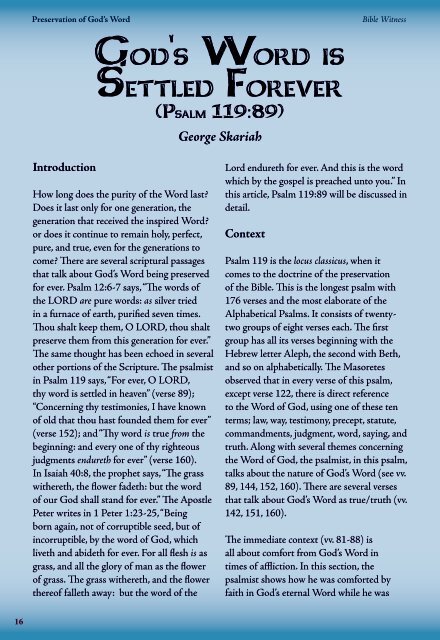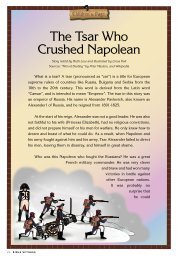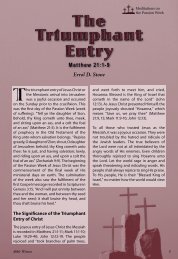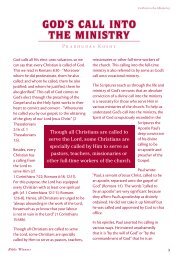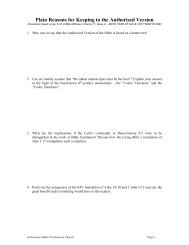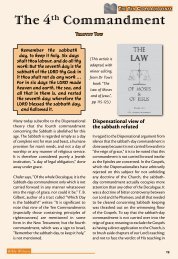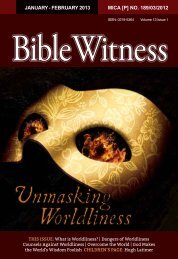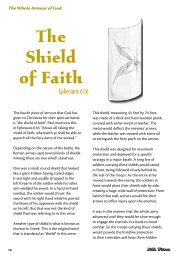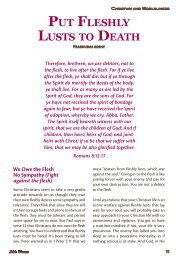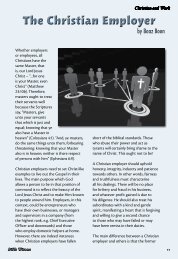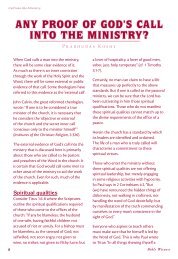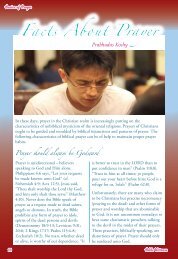God's Word Is Settled Forever (Psalm 119:89)
God's Word Is Settled Forever (Psalm 119:89)
God's Word Is Settled Forever (Psalm 119:89)
- No tags were found...
Create successful ePaper yourself
Turn your PDF publications into a flip-book with our unique Google optimized e-Paper software.
Preservation of God’s <strong>Word</strong>Bible Witnessunder persecution. For that reason, hecommends the worth of God’s <strong>Word</strong>. Hiscommendation of God’s <strong>Word</strong> is based onfour reasons: (1) the stability of God’s <strong>Word</strong>in heaven (v. <strong>89</strong>); (2) the durable usefulnessof it in every age of the church (v. 90a); (3)by God’s <strong>Word</strong>, the earth is established(vv. 90b, 91); and (4) his own experience ofderiving comfort and strength from God’s<strong>Word</strong> in his affliction (v. 92).The Eternal Nature of God’s <strong>Word</strong>(v. <strong>89</strong>)The psalmistsays, “For ever, OLORD, thy word issettled in heaven.”Significantly, thepsalmist places“for ever” in thebeginning of thesentence, followedby “O LORD”in the vocative,together addinggreat emphasisto the statement.The adverb “forever” indicatesindefiniteness of time. It is used in relationto God’s everlasting covenant (Genesis9:16; 17:7, 13, 19; Exodus 31:16), God’slaw (<strong>Is</strong>aiah 59:21; <strong>Psalm</strong> <strong>119</strong>:160), God’spromises (promised dynasty of David: 2Samuel 7:13, 16, 26), His relations with Hispeople (1 Chronicles 29:18; <strong>Psalm</strong> 45:17),Messianic reign (<strong>Psalm</strong> 110:4; <strong>Is</strong>aiah 9:6),etc. Here it is used to express the extent ofthe preservation of God’s <strong>Word</strong>, i.e., “forever,” a time that is indefinite in its extent.The same adverb is also used in verses like<strong>Psalm</strong> 12:7; <strong>119</strong>:152, 160; <strong>Is</strong>aiah 40:8; 59:21(also in 1 Peter 1:23, 25), all referring to thesame topic.That which is settled for ever is “thy word.”What does it refer to? Some people believethat it is “a general designation for God’scommunication, whether spoken or written,although the vast majority of its uses havedirect application to the spoken, not thewritten word” ( James G. Williams, God’s<strong>Word</strong> in Our Hands, 90-91). Without muchobjection, one may accept that “word” couldmean word spoken by God since it has“speech” as its lexical meaning along with“word.” However, this in no way minimizesone’s understanding of “word” as God’swritten <strong>Word</strong> because the written <strong>Word</strong> ofGod is His breathed-out words.The prophets in the Old Testamentfrequently used this word, especially theconstruct phrase “the <strong>Word</strong> of the LORD”or its counterpart “the <strong>Word</strong> of God” to referto God’s revelation which they received from17
Preservation of God’s <strong>Word</strong> Bible Witnessthe Lord and also to that which is alreadywritten. (For example, see the superscriptionsof the prophetical books such as Hosea 1:1;Joel 1:1; Jonah 1:1; Micah 1:1; Zephaniah1:1; Haggai 1:1; Zechariah 1:1; and Malachi1:1; also see 1 Chronicles 17:3.) When theApostle Peter talks about the written <strong>Word</strong>of God (“prophecy of the scripture”) in 2Peter 1:20-21, he refers to it as the <strong>Word</strong>that was spoken, “Knowing this first, that noprophecy of the scripture is of any privateinterpretation. For the prophecy came not inold time by the will of man: but holy men ofGod spake as they were moved by the HolyGhost.”Significantly, the psalmist mentions theother synonyms such as “ordinances,” “law,”“precepts,” “testimonies,” etc. in the samesection, all referring to the written <strong>Word</strong> ofGod. The psalmist, in <strong>Psalm</strong> <strong>119</strong>, constantlyuses these synonyms along with “word” torefer to the written revelation of God.The psalmist uses the verb “settled”, whichhas the root meaning of “to set, to put, toplace.” It is in passive form (Niphal stem),and hence, “to be put, set.” So, it has the senseof to “be stationed,” and “stand firm.” Thenthe psalmist mentions the location of God’s<strong>Word</strong> standing firm, “in heaven.” It is theeternal habitation of the infinite, eternal, andunchangeable God.What does the psalmist assert here? Thepsalmist affirms that God’s <strong>Word</strong> is for evercertain and sure because it is for ever set firmin the eternal heaven. Some say that thisverse only talks about the “immutability ofGod’s truth” and nothing has been said aboutthe “durability of the text” ( J. G. Williams,92). No one challenges the fact that thisverse talks about the immutability of God’s<strong>Word</strong>. However, the point here is that thisverse affirms more than the immutability ofGod’s written revelation. As noted earlier, theadverb “for ever” is placed very emphaticallyin the beginning of the sentence, and withthe added locative “in heaven”. By this, thepsalmist emphasizes the durability as well.Delitzsch comments on this verse, “Eternaland imperishable in the constant verifyingof itself is the vigorous and consolatoryword of God, to which the poet will evercling. It has heaven as its standing-place, andtherefore it also has the qualities of heaven,and before all others, heaven-like stability”(<strong>Psalm</strong>s, 254). Plummer adds, “Howeverfleeting, changeable and unsatisfactory are allthings merely temporal; yet the word of Godis stable, unchangeable and everlasting. Itdepends upon his truth and faithfulness, andthese are so much a part of his nature that ifhe were without them, he would cease to beGod, vv. <strong>89</strong>, 90, 91. The divine faithfulnesshas never failed” (W. S. Plummer, Studies inthe Book of <strong>Psalm</strong>s, 1060).Some people regard what verse <strong>89</strong> teachesto be God preserving His <strong>Word</strong> primarilyin heaven. William Barrick writes, “. . . Godpreserves His <strong>Word</strong> primarily in heaven.God’s revelatory <strong>Word</strong> is fixed firmly inheaven. Regardless of what might happen toHis <strong>Word</strong> on earth, it is securely preservedin His mind” (“Ancient Manuscripts andBiblical Exposition,” The Master’s SeminaryJournal 9/1, 28). It is totally illogical for Godto preserve His <strong>Word</strong> perfectly in heavenand never care about what is happening toHis <strong>Word</strong> on earth. If God is concernedto perfectly preserve His <strong>Word</strong> in heaven,by the same token, He is also concerned topreserve His <strong>Word</strong> on earth. What is the18
Preservation of God’s <strong>Word</strong>point of God having His perfect <strong>Word</strong> inheaven, and His church on earth having acorrupt Bible! God has given His <strong>Word</strong> toHis people on earth, for their profitability—“for doctrine, for reproof, for correction, forinstruction in righteousness: that the manof God may be perfect, throughly furnishedunto all good works” (2 Timothy 3:16, 17).Therefore, it is imperative that the churchmust have all of God’s <strong>Word</strong> always. D. A.Waite writes along the same line, ‘Somepeople say, “Well, it is settled in Heaven butnot on earth.” But God needs it less than wedo; He knows His <strong>Word</strong>. We are the oneswho need it. He is using this verse, <strong>Psalm</strong><strong>119</strong>:<strong>89</strong>, to show us that God has given us<strong>Word</strong>s that are settled’ (Defending the KingJames Bible, 7). The <strong>Word</strong> that is settled inheaven is also available to the psalmist onearth and for that reason he commends theworth of God’s <strong>Word</strong>.ConclusionBible WitnessSeveral points can be observed from thisverse: (1) this verse begins with an emphasison the durability of God’s <strong>Word</strong>, “for ever;”(2) the psalmist then mentions the content,it is “thy word,” the <strong>Word</strong> of the LORD,the written revelation of God; (3) the verb“settled” explains the nature, it is firmly set;(4) the location is the eternal habitat of theeternal God; (5) the ever settled <strong>Word</strong> is everavailable to men on earth for His faithfulnessis unto all generations; and therefore (6) thechurch on earth has the certainty of every<strong>Word</strong> of God. For God’s children, this is acomforting thought: they have all of God’srevealed words in their hands. Therefore,they should love His <strong>Word</strong> and treasure itin their lives by meditating upon it every dayand building their lives in accordance withGod’s holy oracles.19


